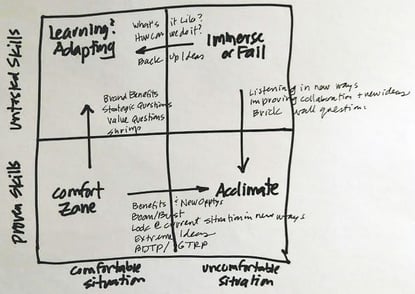In this post, he shares his perspective on the criticality of developing a business, revenue, and profit model that works:
A company I know in Boston is close to closing its doors. This is disappointing, because it’s a truly unique venture that captures the remarkable stories hidden inside of every day people; things you’d usually miss if there weren’t someone clever enough to go looking and tell you what’s really there.
We’re trying to find a revenue model that will allow them to shift gears and have come up with some great short-term ideas. But their long-term viability is still a question mark. Unfortunately, this occurs all the time. People with great convictions start businesses and invest lots of time and money before figuring out how to make a profit.
I heard the same kind of story from another consultant friend recently. After that, I met a young entrepreneur at a Web Innovator’s conference who is struggling to find funding, and still needs to figure out her revenue model.
It’s happening all over the place.
Personally, I work for more than the bottom line and encourage all companies to consider social impact and environmental responsibility as part of their core strategies. But the reality is that we can’t stay in business for long if we’re not profitable. It’s not ok just to build it in the hope that customers will come, unless you are just playing around with a concept and don’t feel attached to a successful outcome.
 You wouldn’t make roast beef without the roast. You don’t make pancakes without eggs. You can’t wash your car without water (well, I suppose you can at a waterless carwash. There’s always an exception). If you are an entrepreneur, you can’t succeed without a viable and flexible revenue strategy. No marketing program can make up for this fundamental truth.
You wouldn’t make roast beef without the roast. You don’t make pancakes without eggs. You can’t wash your car without water (well, I suppose you can at a waterless carwash. There’s always an exception). If you are an entrepreneur, you can’t succeed without a viable and flexible revenue strategy. No marketing program can make up for this fundamental truth.
One of the instructors at Boston University’s graduate entrepreneurship course requires his students to submit business plans with two alternative business models, to prepare them for the reality their core focus could fail or get pushed back. This is the equivalent of a well-stocked kitchen that allows you to improvise and adapt in case you run out of something.
We are entering the age of lean, when young, flexible companies are driving innovation. That’s a good thing. If you count yourself among that crowd, just be sure to stock the cabinets with your main ingredients before you start cooking up your next business idea. Those ingredients must include a solid financial plan and a great network.
In my area, there are lots of support groups offering free consultations. The folks from DartBoston are a good example. I know of others that focus on social entrepreneurship, pre-VC stage strategy, etc. I bet there are some in your area too. My advice is to look around and see who’s willing to give you advice before you get in too deep. Good luck! - Kai Rostcheck



